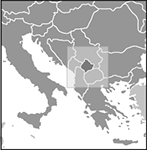
Capital:
Pristina
Area:
10,887 sq km (4203 sq miles)
Population:
1,847,708 (2013 est)
Currency:
1 euro=100 cents
Religions:
Muslim; Eastern Orthodox; Roman Catholic
Ethnic Groups:
Albanian 92%; Serb and other minorities
Languages:
Albanian, Serbian (both official); minority languages
A small country of SE Europe, bordered by Serbia, Macedonia, Albania, and Montenegro. Kosovo’s independence from Serbia is recognized by just over half the world’s nations.
Physical
Kosovo is largely mountainous; plains in the east and west are divided by a central region of hills.
Economy
Kosovo is the poorest country in Europe and relies on remittances from expatriates and international aid. Subsistence farming is common, and cereals, berries, potatoes, peppers, and fruit are the main agricultural products. The principal industries are mining, construction materials, metals, leather, and machinery; exports include metals and metal products, leather products, and machinery.
History
On 28 June 1389 Kosovo Polje (the Field of Blackbirds) was the site of a decisive battle in which the troops of the Serbs were defeated by an invading Ottoman force. Although the Serbs enjoyed early success and Sultan Murad I was killed, his son Bayezid I took command and won the battle. Victory opened the way for Turkish invasion of central Europe. A second battle, between Hungarians and Turks, took place nearby in 1448 and saw Murad II defeat the Hungarians. The Kosovo area was settled by Muslim Albanians during Ottoman rule.
After World War I Kosovo was absorbed into Yugoslavia; it became an autonomous region in 1945. In 1990 it declared independence, but in response Serbia removed its autonomous status. Conflict between Muslim Albanian separatists and Serbian troops continued until 1998, when Serbian forces succeeded in driving out and killing huge numbers of Albanians. This prompted NATO to launch air strikes against Serbia in 1999, which forced Serbia to withdraw its forces and to allow refugees to return. Kosovo was placed under UN administration, and elections were held in 2001. In 2008 it declared independence from Serbia, although the legality of this move was in doubt until a ruling of the International Court of Justice in 2010. The new country had difficulty imposing its authority on the Serb minority in the north. In 2013 an agreement was reached to grant some autonomy to Serbian areas in return for Serbia’s acquiescence in Kosovo’s control of these regions; but there was much opposition in Kosovo to the agreement, which remained unratified in 2017. Serbia does not recognize Kosovo’s independence, and a NATO-led peacekeeping force still enforces peace between Albanians and Serbs. Kosovo signed an association agreement with the EU in 2015. Following an election held in June 2017. The Democratic Party of Kosovo (PDK) formed a new administration under Ramush Haradinaj. In 2017 a special court in The Hague, the Kosovo Specialist Chambers, began investigating atrocities committed by both sides during the Kosovan independence campaign. No indictments had been issued by June 2018.
- long-term evolution
- long terminal repeat
- long-term interest rate
- long-term potentiation
- long-term unemployment
- Longvillian
- Longwangmioan
- long wave
- Long Wavelength Array
- Lonsdale, Dame Kathleen
- Lonsdale, William (1794–1871)
- lookahead
- lookahead unit
- look angle
- lookback time
- lookup table
- loom
- Balboa, Vasco Núñez de (1475–1519)
- Balcombian
- bald cypress
- bald eagle
- bald man paradox
- Baldwin effect
- Baldwin I (c.1058–1118)
- Baldwin, Robert (1804–58)